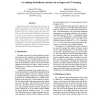Free Online Productivity Tools
i2Speak
i2Symbol
i2OCR
iTex2Img
iWeb2Print
iWeb2Shot
i2Type
iPdf2Split
iPdf2Merge
i2Bopomofo
i2Arabic
i2Style
i2Image
i2PDF
iLatex2Rtf
Sci2ools
ICPR
2008
IEEE
2008
IEEE
On refining dissimilarity matrices for an improved NN learning
Application-specific dissimilarity functions can be used for learning from a set of objects represented by pairwise dissimilarity matrices in this context. These dissimilarities may, however, suffer from various defects, e.g. when derived from a suboptimal optimization or by the use of non-metric or noisy measures. In this paper, we study procedures for refining such dissimilarities. These methods work in a representation space, either a dissimilarity space or a pseudo-Euclidean embedded space. On a series of experiments we show that refining may significantly improve the nearest neighbor classifications of dissimilarity measurements.
Computer Vision | ICPR 2008 | Nearest Neighbor Classifications | Pairwise Dissimilarity Matrices | Pseudo-Euclidean Embedded Space |
| Added | 05 Nov 2009 |
| Updated | 05 Nov 2009 |
| Type | Conference |
| Year | 2008 |
| Where | ICPR |
| Authors | Elzbieta Pekalska, Robert P. W. Duin |
Comments (0)

